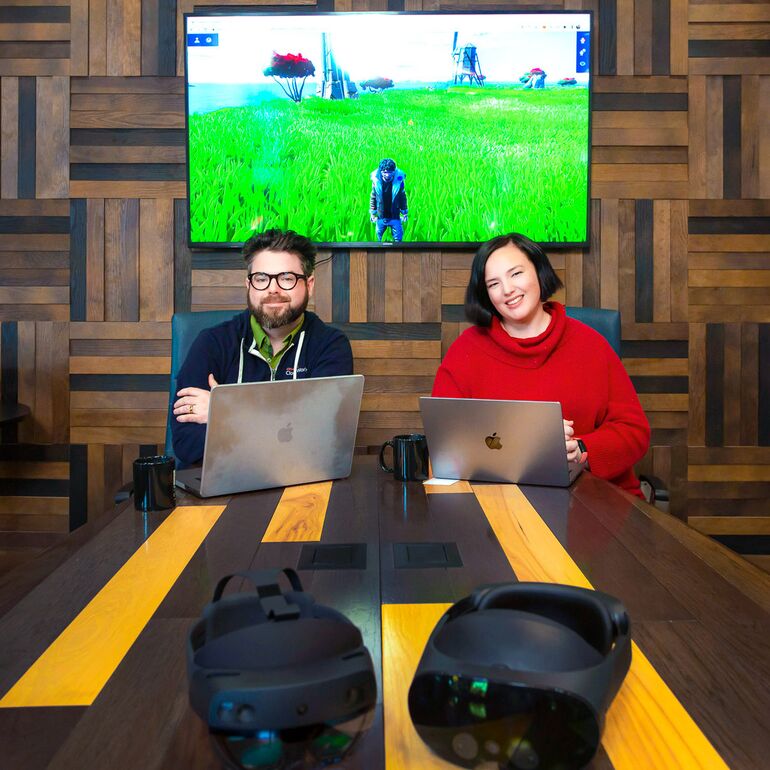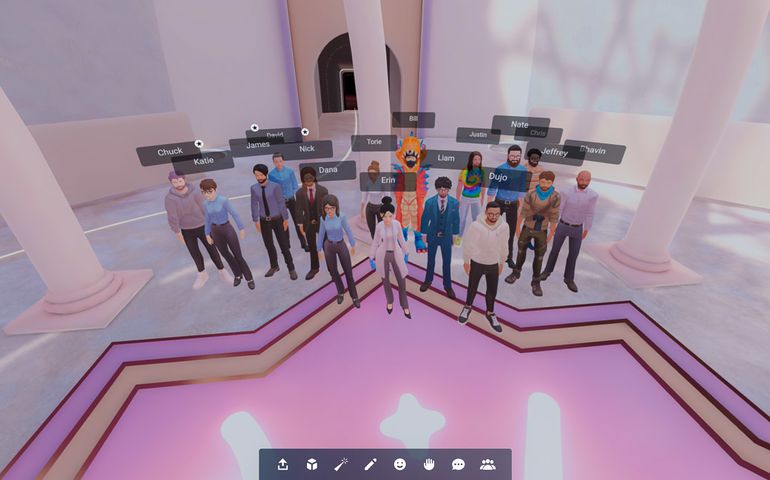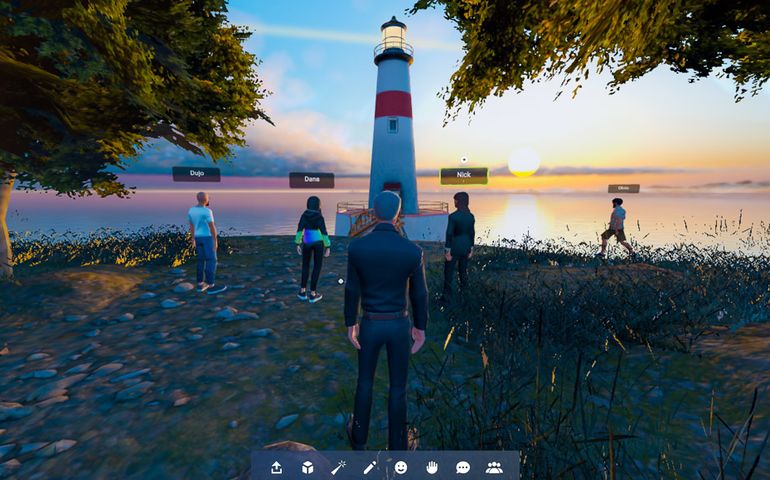Processing Your Payment
Please do not leave this page until complete. This can take a few moments.
Alakazam's virtual worlds take the workplace beyond the Zoom call
William Sullivan, CEO of Alakazam, has a passion for technology and the gaming world that started during his high school years in central Maine.
As a sophomore at Maranacook High School, Sullivan took a website design and development class, which led to an opportunity to work with the high school’s webmaster to build a new website and develop the skills he would need to go into consulting as a student helping local businesses make their websites. Maranacook also sponsored co-curricular activities for learning different types of programming and local area network gaming parties, which allowed Sullivan to learn more about building computer systems.
“When your high school is providing the venue, the equipment, internet, mentorship, and pizza — it was the right recipe at the time to make learning fun. As a senior, I was able to take an independent study with the school’s IT administrator to learn Microsoft Visual Basic, which moved me more into software development,” Sullivan says. “It’s how I found out about Bentley [University], which had run computer programming competitions with various high schools throughout Maine and New England.”
In 2011, Sullivan graduated from Bentley with a Bachelor of Science in computer information systems. After college, he joined Microsoft as part of the Microsoft Academy for College Hires program, specializing in System Center and Azure cloud computing platforms.
“It was a pretty exciting time as Microsoft had just acquired Nokia’s mobile phone division and was launching Windows Phone 7,” says Sullivan. “It was the early days of the consumerization of information technology and the shift from the web to native mobile applications. I pitched an idea for an app called Go to Qi Lu, who was the head of Bing at the time and he liked it so much that Microsoft gave me support to work on it outside of my core role.”
When he left Microsoft and moved back to Maine, he joined Liquid Wireless as one of the first employees post-acquisition by Publishers Clearing House as an Android engineer as part of a small team building a mobile application around their famous sweepstakes called PCH Sweeps.
“It felt like working in a startup within a startup and allowed me to learn quite a bit about casual gaming and advertising. This experience cemented my roots here in Maine and my interest in being involved in startups ever since,” Sullivan says.
Jumping into the virtual world
Sullivan started AMRO Systems, which was later renamed Standard Magic in 2019. He set out to fill the void between virtual reality’s people and process side. He created augmented reality technology which is an interactive experience that combines the real world and computer-generated content. He intended to work with local Maine businesses to identify opportunities to co-develop new augmented and virtual reality products.
When the pandemic hit, all of the opportunities went away and led to his decision to participate in the inaugural cohort of the New England I-Corps at the Massachusetts Institute of Technology. MIT provided cohort participants with the training, interview tools and network to go out into this world to understand how businesses were training, how to market goods and services, and where this technology could provide real value.
“Alakazam employs more than a dozen Mainers and has the potential to continue to grow and be a marvelous success story for our state,” says Brian Whitney, MTI’s president.
The outcome was a prototype for a virtual reality meeting application for business-to-business sales. The company had the opportunity to test with learning and development professionals at IDEXX Laboratories.
“When we showed Dr. Richard Corey at UMaine, he asked if we had thought about having a version that could run in the web browser as well as virtual reality,” said Sullivan. “UMaine VEMI Lab had been looking at several open source projects around WebXR (web-based extended reality), which means a website that is 3D, social with avatars, 3D world environments where people connect in a social way. One of the big challenges we saw with WebXR was the need for providers with Cloud Computing expertise who could help organizations with setting up these kinds of websites.”
“This kicked off our exploration at Standard Magic of these new tools, which we then later saw the opportunity to build a platform around after providing as a service for customers all around the world.”
That led to the creation of Alakazam, which was formed in October 2022.
Alakazam is a primarily remote company, with the majority of the employees living in the greater Portland area. They utilize a floating desk service at CloudPort coworking space in Portland for in-person collaboration. The company has raised investment from local investors, including Maine Technology Institute, Maine Venture Fund and local angel investors.
At its core, the company is a software service for 3D website building and hosting, and our platform allows users to use pre-built virtual world templates and easy-to-use drag-and-drop tools.
“Today, we see the most pain localized in marketing, retail, and education verticals for immersive web technology,” says Sullivan. “Businesses have been using products like Zoom for virtual events, sales and marketing communication, and collaboration. Ever heard of Zoom fatigue? The immersive web takes the idea of video conferencing and adds more elements of interactivity, which we feel add to the experience to make it a more effective communication tool.”
“An immersive website is a virtual world experience hosted in the web browser,” said Sullivan. “There is no application to download or requirement for a virtual reality headset. You can use your computer, mobile phone or tablet, or virtual reality headset web browser to access digital worlds for virtual events, online stores, e-learning, virtual tours, and collaboration. Our customers are businesses who use digital worlds to engage with their audiences with immersive 3D content.”
The base subscription fee is $99 a month. The company also offers premium subscription services for larger enterprise clients needing additional support and scalability at $999 monthly and custom world creation on a project basis.
The company would like to expand this toolset to support augmented reality and new types of content beyond the visual nature of 3D experiences.
Making work meetings fun
Events and meetings are just a small part of what these spaces are designed to do. Alakazam has galleries, theaters, and spaces that can be used for virtually anything subscribers can imagine — in virtual reality, desktop and mobile.
Alakazam creates virtual worlds, avatars, spatial audio and event environments — a plug-and-play experience while offering on-demand assistance where needed for business. Once inside the virtual space, users can create avatars to look like them, changing their hair, eye color, clothes and so on.
Users can have business meetings inside the space. The avatar will talk by the user either typing or speaking into the microphone. Your avatar can also fly around your space, walk around, and add different objects to the space, making the space their own.
But that is not all. Universities and schools have been using the platform to have virtual reality classes.
Class is in session
Anthony Chow, a director of the School of Information at San Jose State University, found Alakazam by putting out a call for virtual reality consultants to help the university create a virtual reality presence as well as start teaching the school about the digital literacy behind how to develop virtual reality spaces so they could teach this to the students.
“Adding a third dimension using virtual reality that is, of course, a 360 experience truly changes the entire paradigm on how we organize, deliver, and access information,” said Chow. “Case in point, I developed my curriculum vitae in virtual reality and have been able to express myself and share my background in different ways.”
The space will be populated with a full-body scan of Chow in avatar form. He will also be adding other media, including slides. It will have a virtual reality library that represents his interactive curriculum.
“In the end, extended reality — virtual reality, mixed reality, augmented reality — is a new world that will continue to increase in popularity because it adds that third dimension,” said Chow. “What can we do with 33% (from 2D to 3D) more room to express ourselves and organize, deliver, and access information? We are also going to be using our mixed reality HoloLens2 at this year’s graduation so that students who cannot attend in person can experience graduation from the first-hand view of a student that can.”
The university will allow graduating students the opportunity to create their own graduation rooms for friends and family. They have created a virtual reality marketing space that students can visit on their computers and devices and in virtual reality alpha format, as well as teaching virtual reality, mixed reality, and augmented reality through the school’s Library Technology Integration Lab. The school has also created digital libraries from symposiums, etc.













0 Comments